
The Network for the Coordination of Statistical Training in Asia and the Pacific
I. BACKGROUND
1. The ESCAP Committee on Statistics (the Committee) at its third session in December 2012 endorsed the objectives, strategy and mechanisms for improving regional coordination of statistical training as proposed by the Working Group on the Regional Coordination of Statistical Training (WG-RCST), which was established by the Committee at its second session.
2. The Committee decided to establish an advisory group for the coordination of statistical training in the Asia-Pacific region, with the Statistical Institute for Asia and the Pacific (SIAP) as its secretariat. The Committee requested its Bureau to finalize the terms of reference and constitute the group.
3. In discussing the role and responsibilities of the group in February 2013, the Bureau concluded that the key role of the group should be to facilitate information sharing and coordination among statistical training institutions in the region rather than just providing advice. The scope of work was thus redefined and reflected in the current terms of reference, which were endorsed by the Bureau at its meeting in September 2013.
II. ROLE AND KEY FUNCTIONS
4. The overall role of the Network is to implement the recommendations of the WG- RCST, endorsed by the Committee. The Network will facilitate information-sharing and promote coordination among national statistical training institutions, regional and international statistical training providers and donor agencies providing funding for statistical training in the Asia-Pacific region in support of the key regional statistics development programmes pursued by the Committee.
5. Specifically, the Network shall have the following key functions:
(a) Identify priorities for coordinating statistical training among training providers in the Asia-Pacific region, and agree on the appropriate approaches and processes for coordination, including for the development of common training programmes in response to the requirements of the Committee’s key regional statistics development programmes;
(b) Share information on the work of statistical training providers, including needs assessment, strategies, existing and upcoming programmes as well as resources available so as to facilitate cooperation among the providers and relevant stakeholders in mobilizing technical and financial resources; and
(c) Periodically review the implementation of the proposed coordination activities, and identify and implement further actions required.
6. The initial focus of the Network shall be the implementation of the following coordination mechanisms
(a) Upon formation of the Network (refer to para 7a, below, for membership), establishing a plan for maintaining and strengthening the network, including the holding of a regular forum on statistical training, such as the SIAP workshop series on “Forging Partnerships in Statistical Training in Asia and the Pacific”;
(b) Regular updating of coordinated training needs assessment, including development of a standard assessment questionnaire and exploring the use of ASTRA or similar software as a tool to manage information on training needs assessment;
(c) Sharing of information on training programmes and events as the basis for identifying gaps in training opportunities; and
(d) Supporting the implementation of training component of priority regional programmes identified by the Committee on Statistics, via the coordination mechanisms above, including the Asia-Pacific Regional Action Plan for the Global Strategy to Improve Agricultural and Rural Statistics through a combination of means, including online training.
III. COMPOSITION
7. The Network shall be composed of:
(a) Heads of statistical training institutions of ESCAP member and associate member States with requisite statistical training facilities or active training programmes on official statistics that cater to both national (internal) and foreign (external) clients;
(b) Representatives of ESCAP member States, regional and international organizations, and sub-regional cooperation entities that deliver training on official statistics or provide substantive donor resource support to statistical training activities in the Asia-Pacific region;
(c) The Chair or Co-Chair of the Partners for Statistics Development in and Asia and the Pacific Group; and
(d) The Chair of the Governing Council of SIAP.
IV. SELECTION OF MEMBERS
8. The Bureau of the ESCAP Committee on Statistics shall decide on the membership of the Network on the basis of the nominations.
9. The Bureau shall issue invitations to all member and associate member States falling under (7a) and (7b), institutions that are leading providers and supporters of training on official statistics falling under (7b), the Chair of the Partnership for Statistics Development in Asia-Pacific Group, and the Chair of the Governing Council of SIAP to serve on the Group.
V. FUNCTIONING, THE CHAIR AND VICE-CHAIR
10. The Network shall conduct discussions mainly through e-mail, facilitated e- discussion groups or webinars.
11. The Bureau will appoint a Chair to guide the work of the Network. The Bureau will also appoint a Vice-Chair to assist the Chair in carrying out the functions of the Network. Both the Chair and Vice-Chair will initially serve until the fourth session of the Committee when the terms of reference of the Network will be reviewed.
12. The Bureau will further appoint a “Core Advisory Group”, based on the recommendations of and from among the members of the Network that would constitute the link to and report to the Bureau. The Core Advisory Group would be composed of the chair, vice-chair and members of the Group who are willing and committed to be the “working engine” of the network, developing the strategic proposals for consultation with the broader network and contributing their time and resources for these purposes.
13. For specific tasks, the Network may invite participation of national and international experts and/or form sub-groups as the need arises.
14. The members of the Network will not be paid by the United Nations. Membership to the Network does not make the individual a staff member of the United Nations and thus not entitled to the privileges and immunities accorded to staff members of the United Nations.
VI. SECRETARIAT
15. The SIAP will serve as the secretariat to the Network.
16. In this capacity, SIAP will
(a) Provide secretariat support to the Chair and Vice Chair in organizing meetings;
(b) Facilitate information sharing on statistical training events through the maintenance of a database and website; and
(c) Provide secretariat support in the implementation of the activities of the Network.
VII. REPORTING
17. The Network shall report to the Committee through a regular item on the agenda of Committee sessions.
18. In between Committee sessions, the Core Advisory Group shall report on outcomes of meetings and discussions and updates on activities to the Committee through the Bureau.
